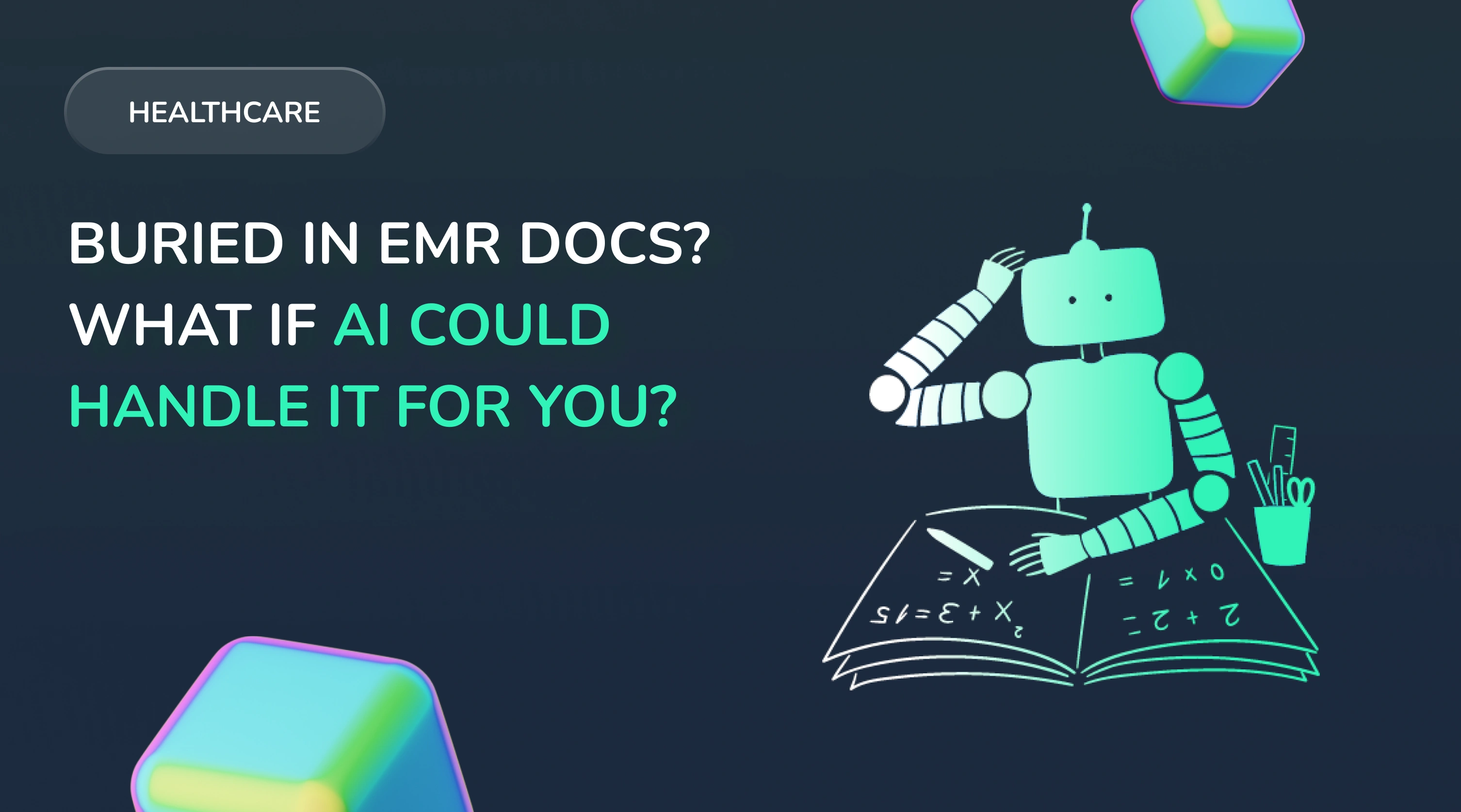
When half of the working time is spent not on treating patients but filling out medical paperwork, everything suffers: team efficiency, service quality, and business revenue.
Electronic Medical Records (EMRs) were created to solve this problem to automate, simplify, and speed up routine tasks. But in reality, things turned out differently:
- Doctors spend up to 50% of their time on data entry,
- Important information gets lost in routine notes,
- The volume of documentation grows faster than it can be processed.
If you are a clinic owner, run a network of medical centers, or work on a healthcare startup, you’ve probably seen how messy documentation can slow down your growth and reduce the quality of care.
In this article, we’ll explain how AI is already helping to bring order to EMRs and why now is the right time to use these technologies in your business.
Where Does EMR Chaos Come From?
Chaos in EMR document management isn’t just a technical glitch. It’s the result of carrying over old paper processes into digital form without rethinking how to work efficiently in the 21st century.
Let’s break down the sources of overload:
- Manual data entry. Even today, doctors and nurses manually enter symptoms, complaints, prescriptions, test results, and more. This wastes valuable time and creates risks of errors and duplication.
- Poor system compatibility. Labs, insurance companies, and different EMR systems inside one medical network often can’t “talk” to each other. Doctors see test results in one place, diagnosis in another, and recommendations somewhere else, and have to put everything together manually.
- Different formats and styles. There is no universal way to record medical information. One doctor writes in detail, another briefly. Emergency departments use templates, dermatologists prefer free form. This turns the system into a mess where it’s hard to find what’s important.
- Rapid data growth. With telemedicine, wearable devices, genetic tests, and AI diagnostics, medical data doubles every 2–3 years. But processing speed hasn’t kept up.
📌 What do we get as a result?
Data is there. Lots of it. But it’s:
- scattered,
- unstructured,
- unavailable for fast analytics and decision-making.
This overload strains staff, causes patient delays, and raises hidden costs — all directly affecting your clinic’s financial health and growth.
What Is AI Automation in Healthcare Document Management?
Imagine an assistant who never gets tired, never makes mistakes, and instantly knows where patient complaints end and doctors’ recommendations begin. That assistant exists — it’s AI-powered healthcare document automation.
Simply put: AI automation is when a “smart” system reads, understands, and organizes medical documents like an experienced specialist — but faster, more accurately, and without human error.
Below is a table showing key tasks AI solves in a medical document management system and the benefits it brings to your healthcare business. Use it as a quick guide to understand the value of AI in medical record review, medical record organization, and AI medical records summary solutions.
| AI Function | What It Does in Practice | Benefits for Business |
| 📄 OCR (text recognition) | Converts scans, PDFs, and photos of documents into editable text | Eliminates manual data entry, saves staff time, and is key for efficient healthcare document processing. |
| 🧠 NLP (text understanding) | Analyzes text content to identify diagnoses, complaints, prescriptions, and other key data | Increases accuracy, reduces errors, and duplicates — improves medical record management. |
| 🧾 Data structuring | Breaks text into logical sections like history, diagnosis, treatment plan, etc. | Simplifies navigation, automates reporting, and boosts efficiency in medical document management systems. |
| 🗂️ Classification & routing | Sorts documents by type and attaches them to the correct electronic medical records (EMR) | Automates workflow, reduces administrative load — part of clinical document management. |
| 🔁 Integration with EMR | Automatically updates patient records within the EMR without human input | Eliminates redundant data entry, improves data quality, and streamlines EMR document management. |
| 📊 Analytics & predictive suggestions | Detects data patterns, flags risks, and suggests actions | Supports better clinical decisions, helps management through AI-driven medical records summary and review. |
A clinic in California implemented an AI module for clinical document management, integrated with their EMR. As a result:
- Manual data entry time dropped by 73%,
- Doctors gained up to 2 hours of free time daily,
- Documentation errors and patient complaints decreased.
Why Is This Important?
With constant time pressure, staff overload, and growing paperwork, AI in medical record management isn’t just a tech trend — it’s a real business helper. It helps to:
- Improve data accuracy,
- Reduce time spent on routine tasks,
- Enhance patient care quality,
- Ultimately, boost clinic efficiency.
In short, AI does not replace doctors but becomes their reliable digital assistant, taking over routine tasks so they can focus on what matters most — patients and business growth.
What Does This Mean for Business?
In healthcare, time is money, and service quality directly impacts a clinic’s reputation and growth. AI-powered healthcare document automation is not just a tech novelty but a real tool to improve efficiency and competitiveness. Let’s look at specific benefits for medical business owners and startups:
| Problem | How AI Solves It in Practice | Why It Matters for Business |
| 🩺 Overworked doctors | AI handles routine data entry and document sorting | Doctors free up time for patient interaction and clinical decisions, reducing burnout |
| 🕵️♂️ Loss of important data | Automatic organizing and structuring of information | Critical info is always available — fewer errors and omissions improve diagnostics |
| 💸 Costly manual processing | Lower admin costs through process automation | Reduces operational expenses, improving clinic profitability |
| ⏳ Slow patient service | Instant access to updated info for each patient | Patients get fast, quality service — builds trust and repeat visits |
| ⚠️ Increased errors and duplicates | Intelligent data control detects and removes duplicates and mistakes | Minimizes clinical errors, improving safety and service standards |
Additional Business Impact
- Increased clinic throughput: Faster data handling lets doctors see more patients without losing quality, thanks to better medical record organization and electronic medical record storage.
- Improved patient experience: Quick responses, accurate data, and ease of service build loyalty and a positive reputation.
- Consistent compliance: Automation ensures adherence to healthcare regulations and standards, reducing the risk of fines.
- Digital maturity growth: AI adoption is a step toward a modern, scalable, and resilient business model ready for new technology integration, leveraging EMR AI and AI in medical record review.
AI-based automation is an investment not just in technology, but in sustainable growth, quality, and the competitive edge of your healthcare business.
CТA: Want to learn how to start implementing AI in your EMR systems? Book A Call today!
What Technologies Power AI Automation in Healthcare Document Management and How Do They Work in Practice?
For effective healthcare document automation, several key artificial intelligence technologies are used. Each addresses specific tasks, and together they create a powerful tool for medical businesses:
Optical Character Recognition (OCR)
Allows the system to “read” scanned documents, handwritten notes, and photos, converting them into editable text. Modern OCR works well even with poor image quality and unusual handwriting. This is essential for medical document management systems handling diverse document types.
Natural Language Processing (NLP)
NLP enables machines to “understand” the meaning of text. It extracts key medical terms, diagnoses, complaints, prescriptions, dates, and organizes them. This transforms raw text into useful data, improving clinical document management and medical record organization.
Machine Learning (ML)
By analyzing large volumes of medical data, ML learns to recognize patterns and errors, automatically correct records, and predict documentation needs. This plays a crucial role in ai medical records and AI medical records summary processes.
Integration with EMR and Other Systems
AI systems easily connect to existing platforms, automatically updating patient charts, uploading new test results, and syncing data with labs and insurers. This smooths EMR document management and supports electronic medical record storage.
How to Know If Your Clinic Needs AI in Healthcare Document Processing?
I’ve seen hundreds of medical businesses, and they often face the same challenges. You don’t need to be a tech expert to realize when it’s time for change. Watch for these signs:
Is your team drowning in paperwork? Are doctors and nurses constantly filling out mountains of documents instead of focusing on patients? That’s the first sign that routine tasks should be handed to healthcare document automation.
Are patients leaving or complaining about long waits? Slow service often happens because the needed information isn’t available on time. Here, AI in medical record review can help speed up processes and improve service.
Want to grow your clinic, open new departments, or launch telemedicine? This is almost impossible without reliable tools for medical record management and document management in healthcare. Automation is a must-have step for growth.
Worried about fines and audit problems caused by document errors? I’ve seen clinics waste time and money due to sloppy paperwork. AI helps keep everything under control and reduces risks.
If you recognize yourself in even one of these points, it’s time to consider AI solutions. This is not just a trendy gadget but a real help that makes your business stronger, safer, and more efficient.
Where to Start?
If you’re not an IT specialist, that’s completely normal. That’s precisely why you shouldn’t delay changes that can seriously improve your business. Implementing AI in medicine isn’t about complicated technology or thousands of confusing terms. It’s about choosing the right partner and having a clear plan.
Here’s what really matters:
- Find experts who already work with healthcare. Healthcare document management is very different from regular business processes. There are many rules, nuances, and risks. A partner with experience knows what to watch out for to avoid common pitfalls.
- Make sure they understand HIPAA and GDPR. Patient data protection is not just a formality but a law you can’t ignore. Professionals will ensure all solutions comply with security and confidentiality requirements.
- Look for ready-made modules that integrate with your system. There’s no need to reinvent the wheel — using proven tools that easily connect to your EMR AI platform and work with your existing systems is better.
- Support at every step. You must not be left alone with the new system, but you are supported by process analysis and goal setting, staff training, and technical help. This ensures a smooth transition and immediate benefits.
This approach is like handing over the technical side to experts while controlling your business completely. You keep managing, and experts handle the complex parts.
Start simple — identify what is holding your clinic back and what problems need solving first. Then, step by step with professionals, transform your clinic into a modern, efficient, and patient-friendly service using a medical records organizer and advanced healthcare document processing technologies.
Documents Are Not the Enemy When You Have Professionals and AI
If managing medical documents feels like an endless headache and chaos, know this: it’s not a sentence. Modern AI solutions already help clinics, startups, and large medical networks work faster, more accurately, and more securely.
But to truly gain all the benefits — from saving time to reducing errors and fines — it’s important to trust experienced experts to implement and support these technologies. They will help choose the right tools, customize the medical document management system to your needs, and support you at every step, removing technical difficulties.
As a result, you will stop struggling with paperwork and be able to focus on what matters — growing your clinic, caring for patients, and improving the quality of medical services.
Wondering how to maintain high-quality and safety standards when working with EMR document management? The following article will explain why healthcare document management quality assurance (Healthcare QA) is the invisible protector of your electronic medical record storage productivity and how testing helps control what matters.
Subscribe to our blog


